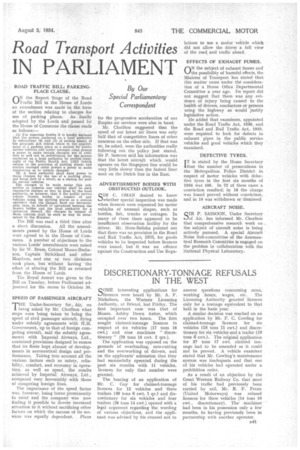Road Transport Activities
Page 53

If you've noticed an error in this article please click here to report it so we can fix it.
IN PARLIAMENT
By Our Special Parliamentary Correspondent
ROAD TRAFFIC BILL: PARKINGPLACE CLAUSE.
ON the Report Stage of the Road Traffic Bill in the House of Lords
• i
an amendment was made n the form of the section relating to charges for use of parking places. As finally adopted by the Lords and passed by the House of Commons the clause reads
as follows:—
. (1) For removing doubts it is hereby declared that the powers conferred on a local authority by subsectiens (21 and (3) of section ninety of the principal Act (which relate to the appointment of a parking place as a station for public service vehicles and confer amongst other powers a power to make certain charges) are in addition to and not in substitution for the powers conferred on a local authority by section sixtyeight of the Public Health Act, 1925 (which relates to the provision of parking places and confers amongst other powers a power to make regulations as to certain charges).
42) A local authority shall have power to make charges for the use of a parking place, not being part Of a street, as a station ICIT public service vehicles. The charges to be made under this subSection as respects any vehicles shall be such reasonable charges as may be fixed by the local authority, so however, that if the public service vehicle licence holder in respect of any vehicles using the parking places as a station considers that the charges fixed are unreasonable, then, in default of agreement between the licence holder and the local authority for a reduction thereof, the charges in respect of those vehicles shall be such as may be determined by the Minister.
The Bill was read a third time after
a short discussion. All the amendments passed by the House of Lords were agreed to in the House of Commons. A number of objections to the various Lords' amendments were raised by Sir W. Brass, Colonel Moore-Brabazon, Captain Strickland and other Members, and one or two divisions took place, but without having the effect of altering the Bill as returned from the House of Lords.
The Royal Assent was given to the Bill on Tuesday, before Parliament adjourned for the recess to October 30.
SPEED OF PASSENGER AIRCRAFT
T"Under-Secretary for , Air, on being asked by Mr. Chorlton what steps were being taken to bring the speed of civil passenger aircraft, flying Under subsidy agreements with H.M. Government, up to that of foreign competing aircraft, said the subsidy agreements with Imperial Airways, Ltd., contained provisions designed to ensure that its fleets kept abreast of developments in aeronautical design and performance. Taking into account all the various factors such as safety, reliability, comfort, and economy in operation, as well as speed, the results achieved by Imperial Airways, Ltd., compared very favourably with those of competing foreign lines.
The importance of the speed factor was, however, being borne prominently in mind and the company was now finding it possible to devote increased attention to it without sacrificing other factors on which the success of its services was equally dependent. Plans for the progressive acceleration of our Empire air services were also in hand.
Mr. Chorlton suggested that the speed of our latest air liners was only half that of competitive liners of other concerns on the other side. If that was so, he asked, were the authorities really following out the policy just stated. Sir P. Sassoon said his information was that the latest aircraft which would operate on the Singapore line would be very little slower than the fastest liner used on the Dutch line in the East.
ADVERTISEMENT BODIES WITH OBSTRUCTED OUTLOOK.
QM C. OMAN desired to know L./whether special inspection was made when licences were requested for motor vehicles of unusual shapes, such as bottles, fish, trunks or cottages. In many of these there appeared to be insufficient observation facility for the driver. Mr. Hore-Belisha pointed out that there was no provision in the Road and Rail Traffic Act, 1933, for goods vehicles to be inspected before licences were issued, but it was an offence against the Construction and Use Regu lations to use a motor vehicle which did not allow the driver a full view of the road and traffic ahead.
EFFECTS OF EXHAUST FUMES.
ON the subject of exhaust fumes and the possibility of harmful effects, the Minister of Transport has stated that this matter came under the consideration of a Home Office Departmental Committee a year ago. Its report did not suggest that there was any evidence of injury being caused to the health of drivers, conductors or persons using the highway as would justify legislative action.
He added that examiners, appointed under the Road Traffic Act, 1930, and the Road and Rail Traffic Act,. 1933, were required to look for defects in exhaust pipes in the public service vehicles and good vehicles which they examined.
DEFECTIVE TYRES.
IT is stated by the Home Secretary that the number of prosecutions in the Metropolitan Police District in respect of motor vehicles with defective tyres in the first six months of 1934 was 100. In 72 of these cases a conviction resulted: in 18 the charge was found proved without conviction, and in 10 was withdrawn or dismissed
AIRCRAFT NOISE.
SIR P. SASSOON, Under Secretary of Air, has informed Mr. Chorlton that comprehensive research work on the subject of aircraft noise is being actively pursued. A special Aircraft Noise Sub-corarnitttee of the Aeronautical Research Committee is engaged on the problem in collaboration with the National Physical Laboratory.






















































































